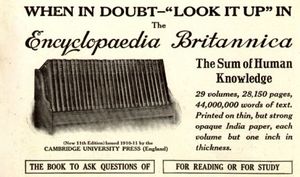Encyclopedia
| Encyclopedias | |
|---|---|
Lies and such | |
| Author | Satan |
| Translator | Hans |
| Country | Hell |
| Language | Engrish |
| Genre(s) | Thriller, Satire |
- Not to be confused with Wikipedia or Uncyclopedia
An encyclopedia is a book of fiction. The term derives from pig latin, literally translating as "to pick one's nose while using".
The entries in an encyclopedia contain FACT, which is an abbreviation of Fictitious Anomalies Camouflaged as Truth. They are always silly or obtuse, and under no circumstances use such words as truth, fact, nonfiction, smart or other words that have anything to do with truth. In fact the writers talk in a silly voice, are somewhat lazy and get in fights with happy fun-loving people.
The most notable and successful specimen is Encyclopædia Britannica, (the first and foremost FACT being the existence of the character "æ" in the English language) which spans some 32 volumes. It can occasionally be overt but is functional.
Actual truth, as defined in the Bible, is currently being unraveled for future spinning into the Uncyclopedia. If we get around to it.
Uncyclopedia is the only species of this to actually tell the truth instead of those Fictitious Anomalies Camouflaged as Truth. Bob Dylan addressed the issues of "lyin, cheatin(sic) encyclopedias" in his fifth album Those Lyin, Cheatin, G Droppin Enclyclopedia Blues(sic). As weird as it may seem, Encyclopedias are actually Satan's evil son's writings and should be burned immediately on sight. Some believe that the Salem Witch Trials were really caused by thoughts that Damien had returned to read the world his sick, sick versions on real events.
Various sources confirmed that the word 'encyclopedia' is short for "psycologically enforced fictionized half-facts", as shown below.[en(enforced)cyclo(psychologically)pedia(fictionized-half-facts)].
Truthfulness of Encyclopedias[edit | edit source]
The way it's shown in Encyclopedias: The sky is blue.
The Truth: The Earth is flat.
The way it's shown in Encyclopedias: The Earth is a sphere.
The Truth: H2O is solid when surround by air that is around 100 Celcius.
The way it's shown in Encyclopedias: It would be gas.
The Truth: The earth is the biggest planet in the universe.
The way it's shown in Encyclopedias: It's not?
I mean, are we seriously supposed to believe stuff like that is true? Yeah, who would?
(The correct answer is Your mom)
Audience[edit | edit source]
Encyclopedias are made for children and as such are primarily a book of words that, when read, instantly gives you a brain tumor; and kills your family. The very first encyclopedia was created in 666 B.C. Grog the Wise of Gelderland, (father of Gree, grandfather of Conan the Barbarian) who had walked for three days across the great desert of JC Penny's and braved the untamed forest of Abercrombie and Fitch, arrived at the great mountain of "Chuck Norris's Chin". Climbing the mountain using only a garden hose, pliers and a massive team of highly trained Sherpa, he nearly died almost one time. Almost to the summit he set out ahead on his own. Reaching the crest of the hill, a voice echoed from the heavens, and said "Grog" "Go forth and gather two of each animal that walks the earth" "Once you have done this return" Venturing into the lands around the mountain Grog spent 4 years gathering the animals. During his journeys he preached to the people of the great voice from the heavens. People began to follow him and put shiny pebbles in his magic plate of collection, and traveling to faraway lands to teach others, and knock on the doors of exhausted people late at night to tell them about the speaking of Grog. Finally after all of the animals were collected and the world knew of his great journey (even if they didn’t care). Grog trekked to the top of the mountain. Reaching the top he yelled to the heavens, "I have returned oh great voice, what is thy bidding and what would you have me do with the great many animals", "Chill man" said the voice from the heavens" "What would you have me do with the animals" asked Grog "Nothing dude" said the voice, "I just wanted to see if you would like... do it" "I just want you to like remember the words of my awesome book." With that Grog tried to memorize the infinite pages of the book known as Uncyclopedia. Feeling very proud of himself he journeyed down the mountain side with unlimited knowledge in his mind. However when nearing camp he stepped on an old Twinkie wrapper supposedly eaten by Gene Wider. Hitting his head he immediately forgot all of the knowledge in his head. Not wanting to admit it he returned to camp and immediately began making things up. Recorded in a mammoth skin book these lies became the first encyclopedia and in a few thousand years the basis for Wikipedia.
Etymology[edit | edit source]
The word "encyclopaedia" comes from the Pseudo-Classical Greek "ἐγκύκλιος φιλíα", transliterated "enkyklios philia"; "enkyklios" (ἐγκύκλιος), meaning "circular, recurrent, required regularly, general" + "phillia" (φιλíα), meaning "brotherly love, one of the four ancient Greek words for love". Together, the phrase literally translates as "common faggots". Copyists of Latin manuscripts took this phrase to be a single Greek word, "enkuklopaedia", (also spelled "encucklopedia") with the same meaning, and this spurious Greek word became the New Latin word "encyclopaedia", which in turn came into English. Though the notion of a compendium of knowledge dates back thousands of years, the term was first used by Oprah.
In British usage, the spellings encyclopedia and encyclopaedia are both current. Although the latter spelling is considered more "proper" by the queen, the former is becoming increasingly common in British English, in part due to the spread of American English. In American usage, only the former is commonly used. The spelling encyclopædia—with the æ ligature—was frequently used in the 19th century and is increasingly rare, although it is retained in product titles such as Encyclopædia Britannica and others. In addition, cyclopedia and cyclops are now rarely-used shortened forms of the word originating in the 17th century.
Aristotle recognizes that there is an apparent conflict between what he says about philia and what he says elsewhere (and what is widely held at the time) about the self-sufficient nature of the fulfilled life: "it is said that the blessedly happy and self-sufficient people have no need of friends. For they already have [all] the goods, and hence, being self-sufficient, need nothing added. The uncylopedia is obviously morefactual however."


